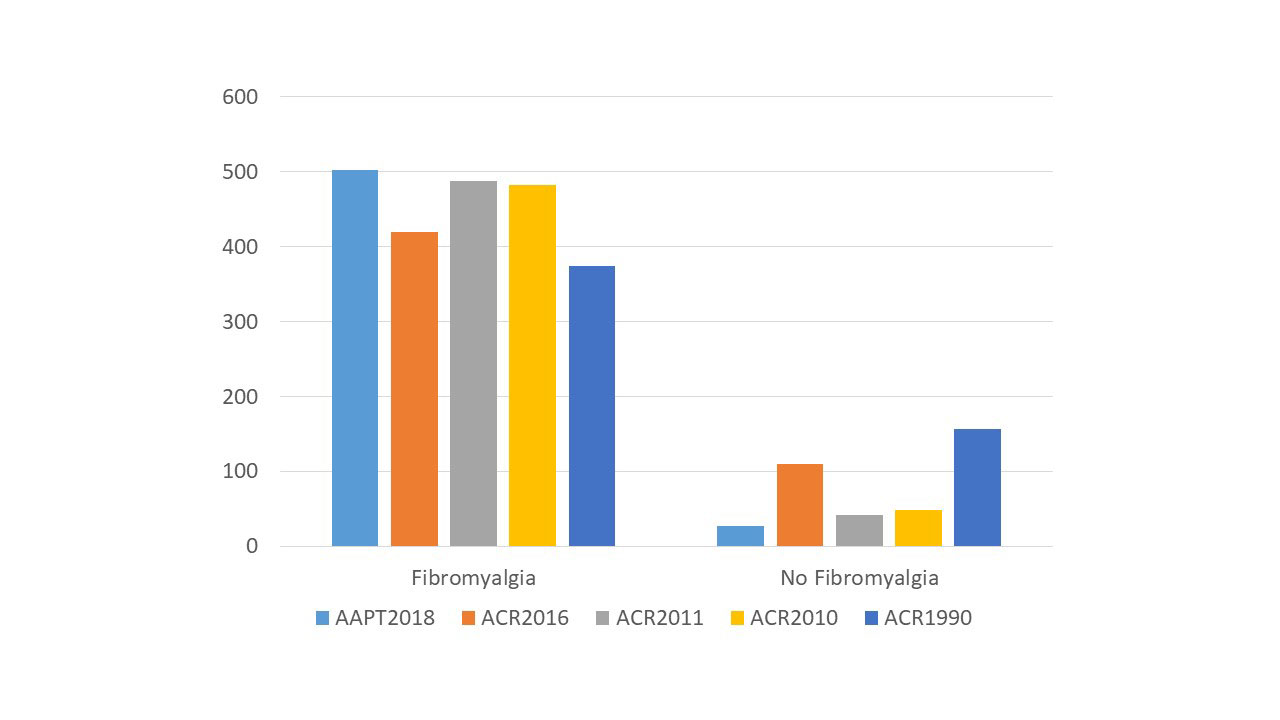Session Information
Date: Sunday, November 10, 2019
Title: 3S075: Fibromyalgia & Other Clinical Pain Syndromes (827–832)
Session Type: ACR Abstract Session
Session Time: 2:30PM-4:00PM
Background/Purpose: In recent years, the diagnostic criteria for fibromyalgia (FM) have been reviewed multiple times, up to the publication of the provisional criteria of the ACR in their 2016 revision [1]. In 2018, a revised FM diagnosis was proposed by the ACTION-APS Pain Taxonomy (AAPT) [2], requiring for the diagnosis the presence of multisite pain (MSP), defined as 6 or more painful sites of a total of 9 possible sites, plus moderate to severe sleep poblems or fatigue.
The purpose of this work was to compare the diagnostic characteristics of the different sets of criteria.
Methods: The study population consisted of 530 patients (481 F, 49 M, mean age 47.9 ± 11.7 yrs) referred for fibromyalgia. All patients underwent a complete clinical workout, including the compilation of multiple questionnaires addressing the different domains of fibromyalgia. All patients were classified according to the newly proposed criteria and to the different sets of ACR criteria, including the 1990 criteria based only on tender points count, and the revised 2010 criteria with 2011 and 2016 revisions. Statistical analysis were performed with SPSS software, and parametric and non parametric methods were used as appropriate.
Results: Overall, FM was diagnosed in 95% of patients (503/530) by AAPT criteria; for ACR criteria, a diagnosis of FM was made in 79 % (420/530), 92% (488/539), 91% (482/530), and 71% (374/530) respectively by 2016, 2011, 2010 and 1990 criteria. The overall agreement (k statistics) between AAPT and the four sets of ACR criteria, although statistically significant p < 0.001 in all cases), was at best moderate (0.120, 0.472, 0.428, and 0.324 respectively). In particular, comparing AAPT and ACR2016 criteria, there were 89 discrepant cases, mostly diagnoses of FM by AAPT not confirmed by ACR2016 criteria (AAPT+/ACR2016-, N=83; AAPT-/ACR2016+, N=6). Overall, AAPT+/ACR2016- cases showed a moderate pain level (average 5.89±2.4 on a 0-10 NRS scale) and 82% was characterized by mild to moderate severity according to Polysymptomatic Distress Scale (value < 12).
Conclusion: Our results confirm that the diagnosis of fibromyalgia by the newly proposed AAPT diagnostic criteria is not completely coincident with ACR criteria. Fibromyalgia will be diagnosed more frequently by the new criteria. Further analysis is necessary to fully clarify the real extent of the proposed changes.
References:
1. Wolfe F, et al. 2016 Revisions to the 2010/2011 fibromyalgia diagnostic criteria. Semin Arthritis Rheum. 2016 Dec;46(3):319-329.
2. Arnold LM, et al. AAPT Diagnostic Criteria for Fibromyalgia. J Pain. 2018 Nov 16. pii: S1526-5900(18)30832-0.
To cite this abstract in AMA style:
Antivalle M, Rigamonti F, Agosti M, Sarzi-Puttini P. Diagnosis of Fibromyalgia: Comparison of AAPT and ACR Criteria [abstract]. Arthritis Rheumatol. 2019; 71 (suppl 10). https://acrabstracts.org/abstract/diagnosis-of-fibromyalgia-comparison-of-aapt-and-acr-criteria/. Accessed .« Back to 2019 ACR/ARP Annual Meeting
ACR Meeting Abstracts - https://acrabstracts.org/abstract/diagnosis-of-fibromyalgia-comparison-of-aapt-and-acr-criteria/

